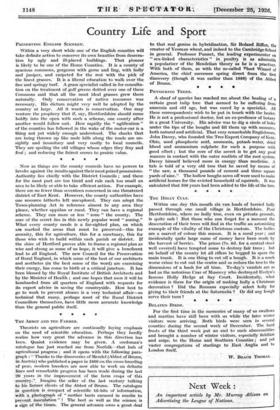Country Life and Sport PRESERVING ENGLISH SCENERY.
Within a very short while one of the English counties will take definite action to conserve its own beauties from desecra- tion by ugly and ill-placed buildings. That pioneer is likely to be one of the Home Counties. It is a county of spacious commons, gorgeous with gorse and ling, with holly
and juniper, and carpeted for the rest with the -pick of the finest grasses. It is a liberal education to walk over the fine*and springy turf. A grass specialist called in for consulta- tion on the treatment of golf greens dotted over one of these Commons said that all the most ideal grasses grew there naturally. Only conservation of native resources was necessary. His dictum might very well be adopted by the country at large. All it wants is conservation. One may venture the prophecy that if, say, Hertfordshire should come boldly into the open with such a scheme, one county after another would follow suit. How rapidly the " uglification" of the counties has followed in the wake of the motor-car is a thing not yet widely enough understood. The shacks that are being thrown up like mole hills along the roads are un- sightly and insanitary and very costly to local councils. They are spoiling the old -villages whose edges they fray and foul ; and reducing the fairest scenes to prairie value.
* * * • Now as things are the county councils have no powers to invoke against the insults against their most prized possessions. Authority lies chiefly with the District Councils ; and these for the most part are too timid and rule each too small an area to be likely or able to take efficient action. For example, there are no fewer than seventeen concerned in one threatened district of East Kent. However, the county authorities have one resource hitherto left unexplored. They can adopt the Town-planning Act in reference almost to any area they please, whether oppidan or rural. They can have a regional scheme. They can more or less " zone " the county. The core of the secret lies in this newly popular word " zoning." What every county needs is a far-sighted plan, on which are marked the areas that must be preserved—this for amenity, this for agriculture, this for a sanctuary, this for those who wish to build within each parish or district. If the shire of Hertford proves able to frame a regional plan as wise and strong as some of us hope, it will give a beneficent lead to all England. The new Council for the Preservation of Rural England, in which some of the best of our architects and aesthetes (in the best sense of the word) are exercising their energy, has come to birth at a critical juncture. It has been blessed by the Royal Institute of British Architects and by the Minister of Health ; and one hopes that soon it will be bombarded from all quarters of England with requests for its expert advice in saving the countryside. How best to go to work to prevent abuses is a very technical affair—so technical that many, perhaps most of the Rural District Councillors themselves, have little more accurate knowledge than the general public itself.


































 Previous page
Previous page